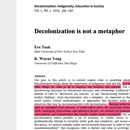My problem with the classification of my race wasn’t brought to light until I was filling out my applications for college. Throughout the long and messy process, I noticed that there are seemingly no in-betweens when it comes to race for the Latinx community: you’re either light-skinned and mark “White,” or you’re dark-skinned and mark “Black” or “African American.”
Now, many might think this isn’t a big deal. Technically, as a mestiza , I’m partially of European descent and therefore light-skinned. But to me, the lack of recognition for the rest of my heritage perpetuates the idea that the White race is dominant. By marking “White” as my race, I am stripped of the Mayan, K’iche’ and other Native Guatemalan heritage that my skin color proudly represents and forced to submit to the idea that the only part of my heritage that matters is the far-removed European genes in my genome.
On many applications and documents, there is the option to choose Hispanic or Latino for ethnicity. However, there is often also a section for race that is much more ambiguous.
To fill out an application of this sort, I would easily check Hispanic or Latino for ethnicity, but the next part always leaves me wondering if I can ever pick the right answer. I don’t have any recent African descent and I’m not Black. I’m also not just White because many of my direct family members are of Native descent. So do I pick White just because I am light-skinned?
As you may be able to tell by now, this is hard for me, but it’s even harder for dark-skinned Latinx like my dad. Going as far back as my great-great-great-grandparents, we know that none of my recent ancestors are of African descent, and yet my dad carries a beautiful mocha tone to his skin. So what should he mark? He isn’t light-skinned, and he isn’t of African descent or Black, so what is he?
By this method, the only thing that characterizes our race is our skin color. But race runs much deeper than the pigment of our skin. To help fix this problem, applications and documents should include sections for people of Native Latin American descent or a “check other” section with a space to fill in the name of the Native Latin American Peoples they identify with.
At the end of it all, my skin color should not be the only characteristic that makes up my race.

